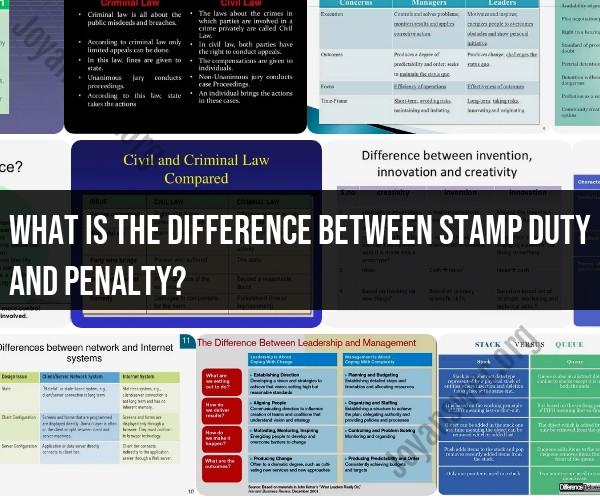What is the difference between stamp duty and penalty?
Stamp duty and penalties are two distinct concepts related to taxation and legal consequences, respectively. While both involve monetary payments, they serve different purposes and are imposed under different circumstances. Here's a breakdown of the differences between stamp duty and penalties:
Stamp Duty:
- Definition: Stamp duty is a tax imposed by governments on certain types of documents, instruments, or transactions. It's often levied to make these documents legally effective or to generate revenue for the government.
- Purpose: The primary purpose of stamp duty is to validate documents and ensure their legality. It's also a source of revenue for the government.
- Types of Documents: Stamp duty is typically levied on documents such as property deeds, share transfers, leases, agreements, mortgages, insurance policies, and other legal instruments.
- Calculation: The amount of stamp duty is usually based on the value of the transaction or the property involved. Rates can vary depending on the jurisdiction and the nature of the document.
- Payment: Stamp duty is paid when the relevant document is executed or registered. It's typically paid by the parties involved in the transaction.
- Legal Consequences: Paying the required stamp duty is crucial for the document's legal validity. Failure to pay stamp duty can result in the document being deemed inadmissible as evidence in court.
Penalty:
- Definition: A penalty is a financial consequence imposed by authorities as a punishment for violating laws, regulations, or rules. Penalties are often intended to deter non-compliance and encourage adherence to laws.
- Purpose: Penalties serve as deterrents against unlawful behavior, encourage compliance, and ensure fairness and equity.
- Types of Violations: Penalties can be imposed for a wide range of violations, such as traffic violations, tax evasion, regulatory non-compliance, criminal offenses, and more.
- Calculation: The amount of a penalty can vary based on the severity of the violation and the laws of the jurisdiction.
- Payment: Penalties are usually paid to the relevant government agency responsible for enforcement. The payment is typically made by the individual or entity found in violation.
- Legal Consequences: Penalties are punitive measures that individuals or entities must pay as a consequence of their actions. Non-payment of penalties can lead to further legal actions, including legal proceedings and potential imprisonment in serious cases.
In summary, stamp duty is a tax imposed on specific documents or transactions to validate their legality and generate revenue, while penalties are fines imposed as punishments for violating laws or regulations. The key distinction lies in the purpose, nature, and consequences of these financial obligations.













